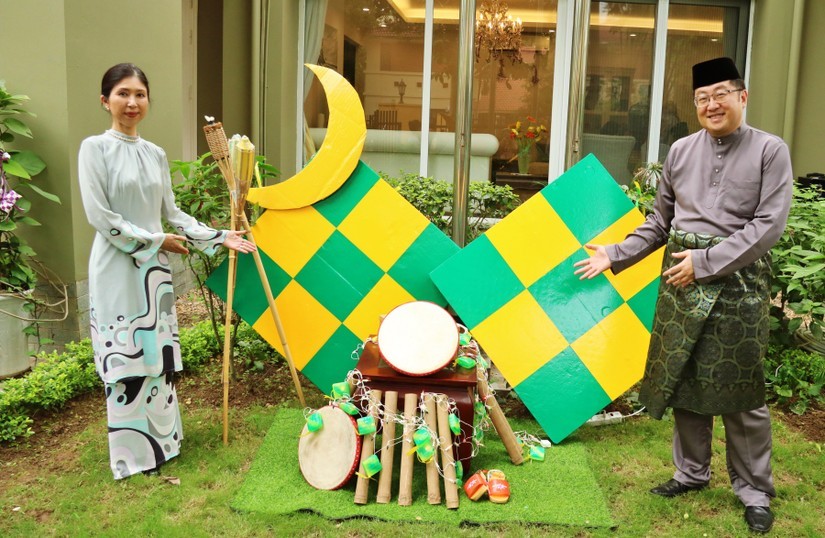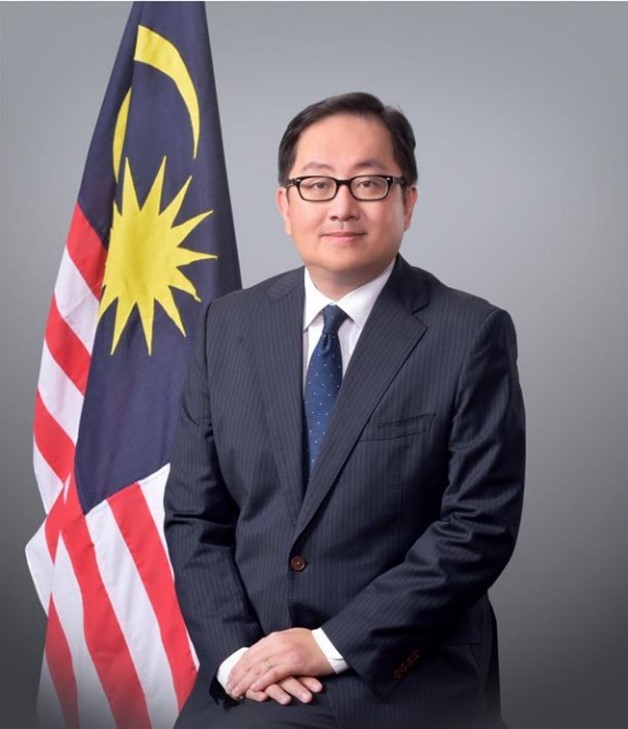
Vietnam’s foreign policy directs it to become integrated into the global community: Malaysian Ambassador
Latest
 |
| Malaysian Ambassador Dato' Tan Yang Thai organized the Hari Raya Ceremony in Vietnam (April, 2023). (Source: ASEAN Mekong) |
Could you please share your overall assessment of Vietnam’s diplomatic policy?
The bamboo diplomacy shapes Vietnam’s foreign policy based on firm ideals, while allowing for flexibility in its expression and methods. It can be said that this is a very apt approach suited to Vietnam’s overall situation. It also seems to have served Vietnam well, especially when reviewed through the lenses of the numerous strong bilateral ties Vietnam has built with other countries in the region and around the world.
In this regard, Malaysia also sees Vietnam as a valuable partner, with the bilateral relations between our two countries growing from strength to strength. Relations reached an important milestone in 2015, with the establishment of the Malaysia-Vietnam Strategic Partnership and this year marks another with the 50th anniversary of the establishment of diplomatic relations.
 |
| Malaysian Ambassador to Vietnam Dato’ Tan Yang Thai. (Photo: QT) |
In your own view, what are outstanding foreign achievements that Vietnam has achieved?
Certainly, there have been many achievements that Vietnam have made through the implementation of its foreign policy. And here I would like to highlight the achievements that I think not only have been beneficial to Vietnam, but have also contributed positively to the region - which I think should be commended on. I would like to highlight the relatively recent ones as I think these would be relevant when talking about Vietnam’s foreign diplomacy
Firstly, with regards to membership of ASEAN, Vietnam has shown itself as a contributing member supportive of strengthening ASEAN and its role in the region and globally. Vietnam’s recent Chairmanship of ASEAN in 2020 also made apparent its commitment, proactiveness, and able stewardship, especially in light of the fact that the Chairmanship coincided with the outbreak of the COVID-19 pandemic.
Despite the challenging environment wreaking logistical havoc on meeting preparations, forcing delays and changes in timings and formats of the meeting, ASEAN as a group was able to issue the Chairmans’ Statement on ASEAN Collective Response to the Outbreak of Coronavirus Disease 2019 in mid-February of 2020. Furthermore, the ASEAN Comprehensive Recovery Framework (ACRF) and its Implementation Plan was adopted by ASEAN Leaders at the 37th ASEAN Summit in November under Vietnam’s chairmanship. The ACRF serves as ASEAN’s community-wide exit strategy from COVID-19 and recognizes the need to work together from the recovery phase through to long-term resilience.
Secondly, I would like to highlight Vietnam’s membership as a non-permanent member of the United Nations Security Council (UNSC) for the term 2020-2021, for which it received the support of 192 out of 193 countries during the elections. Vietnam took on the role as a bridge-builder, and scored a number of ‘firsts, namely having the first UNSC briefing on cooperation between the UN and ASEAN and the promotion of ASEAN’s centrality and presence at the UNSC in addressing important regional issues, hosting the first UNSC Arria - Formula Meeting on Addressing Challenges of Children without Parental Care in Conflict Situations, and presiding over the adoption of the first-ever standalone Presidential Statement on the High level Open Debate on “Upholding the UN Charter”.
Furthermore, during its tenure, Vietnam took on the promotion of important and wide-ranging issues including strengthening humanitarian action and the protection of civilians in armed conflicts; long term consequences of wars and conflicts on people, and the security and development of all nations, support of vulnerable groups particularly women and children, climate change, the COVID-19 pandemic and maritime and climate security.
Beyond these multilateral platforms, I think it is also worth highlighting that Vietnam’s foreign policy directs it to become integrated into the global community. This massive change, from being a country that was once sidelined and embargoed, to one that fully participates and engages with other countries, including establishing comprehensive strategic partnerships and strategic partnerships with permanent member countries of the UNSC and G20 countries is one of Vietnam’s important achievements from a foreign policy perspective.
Besides Vietnam's contributions to the United Nations and ASEAN, what are your impressions of Vietnam's efforts in solving global problems?
In addition to the United Nations and ASEAN, Vietnam is currently a member to numerous important international organisations and forums including the Asia-Pacific Economic Cooperation (APEC) forum, the World Trade Organisation, (WTO), World Health Organization (WHO), the International Atomic Energy Agency (IAEA), International Labour Oganisation (ILO), Asian Development Bank (ADB), Organisation for the Prohibitions of Chemical Weapons (OPCW) and others.
This is a sign of Vietnam being a highly integrated member of the global community; furthermore, it has shown willingness to actively and positively contribute through membership of the various multilateral platforms. I believe that this trend will continue, and Vietnam has the potential and capability to contribute even more in the future.
| Malaysian Ambassador: "About Vietnamese diplomats, two words come to mind – capable and committed. Since taking up my post here in Vietnam, and having worked closely with several Vietnamese diplomats for close to a year now on a number of issues as well as events, not least of which were high level visits including the visit of Prime Minister Anwar Ibrahim to Hanoi, as well as commemorative events in conjunction with the 50 year anniversary of Malaysia-Vietnam celebrations. It is apparent to me that Vietnamese diplomats are highly capable and fully committed to serving for the good of their country". |













